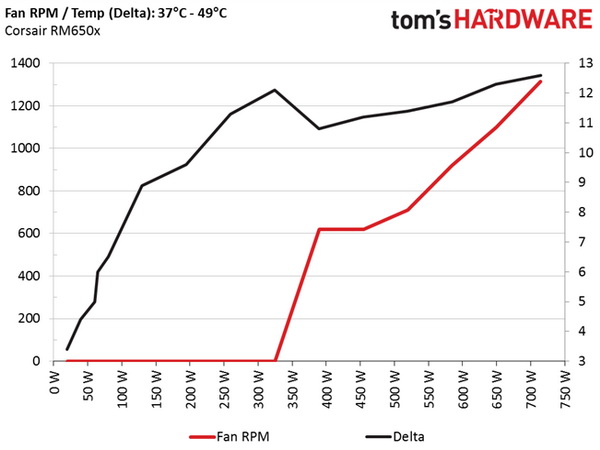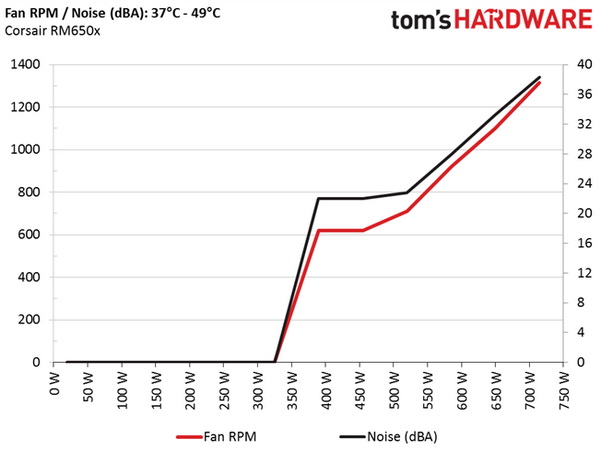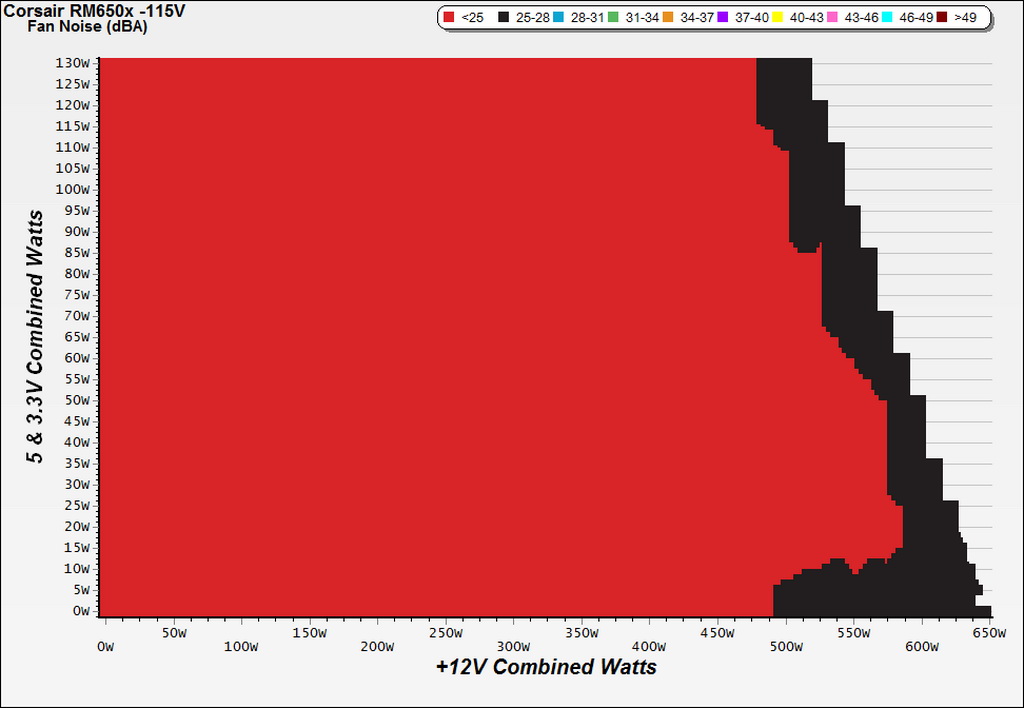Corsair RM650x PSU Review
Another Corsair PSU is in the lab, commanding our attention. We already reviewed the RM750x and RM550x, so we couldn't leave out the RM650x. It promises the same high performance as its siblings, along with super quiet operation.
Why you can trust Tom's Hardware
Efficiency, Temperature And Noise
Efficiency
Our efficiency testing procedure is detailed here.
Using the results from the previous page, we plotted a chart showing the RM650x efficiency at low loads, and loads from 10 to 110 percent of the PSU's maximum-rated capacity.
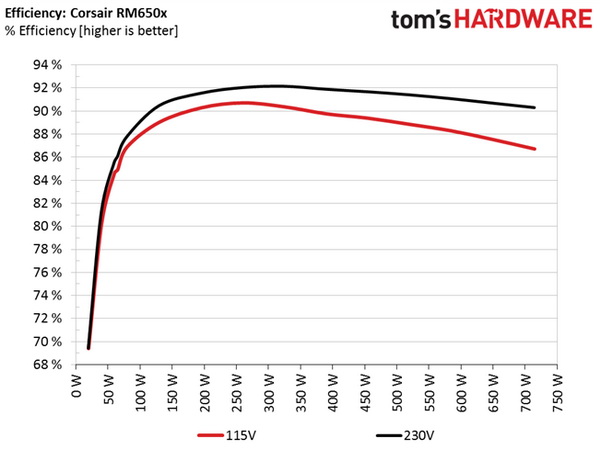
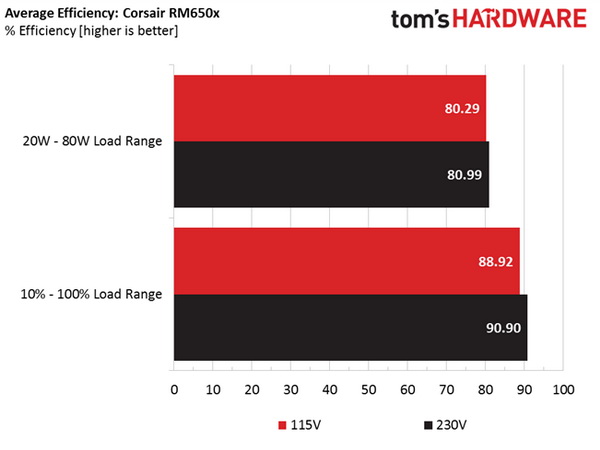
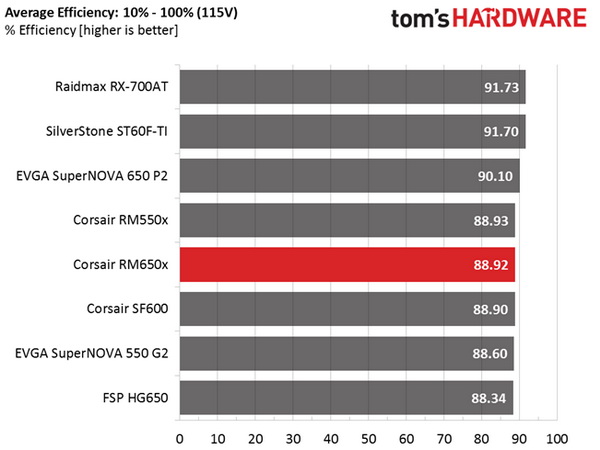
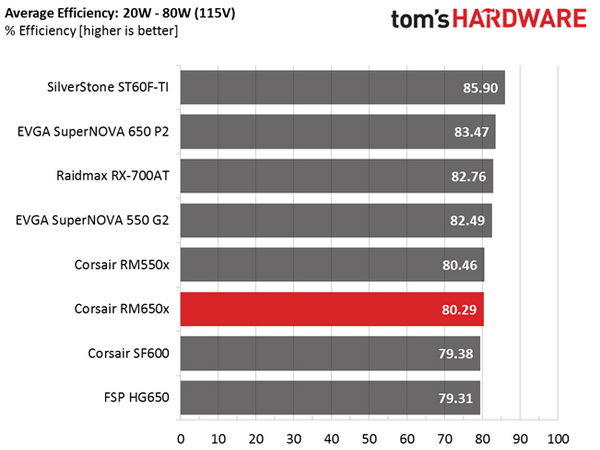
Efficiency is quite high under normal loads, and fairly good with light loads. Given the 80 PLUS Gold certification, our results fall within the expected levels.
Efficiency At Low Loads
In the following tests, we measure the RM650x's efficiency at loads significantly lower than 10 percent of its maximum capacity (the lowest load the 80 PLUS standard measures). The loads we dialed were 20, 40, 60 and 80W. This is important for representing when a PC is idle, with power-saving features turned on.
| Test # | 12V | 5V | 3.3V | 5VSB | DC/AC (Watts) | Efficiency | Fan Speed | Fan Noise | PF/AC Volts |
|---|---|---|---|---|---|---|---|---|---|
| 1 | 1.206A | 0.491A | 0.481A | 0.195A | 19.61 | 69.42% | 0 RPM | 0 dB(A) | 0.856 |
| 12.073V | 5.043V | 3.313V | 5.038V | 28.25 | 115.1V | ||||
| 2 | 2.444A | 0.990A | 0.995A | 0.395A | 39.77 | 80.21% | 0 RPM | 0 dB(A) | 0.933 |
| 12.068V | 5.041V | 3.312V | 5.031V | 49.58 | 115.3V | ||||
| 3 | 3.680A | 1.477A | 1.509A | 5.028A | 59.83 | 84.61% | 0 RPM | 0 dB(A) | 0.959 |
| 12.064V | 5.040V | 3.312V | 5.028V | 70.71 | 115.2V | ||||
| 4 | 4.907A | 1.985A | 1.990A | 0.795A | 79.76 | 86.90% | 0 RPM | 0 dB(A) | 0.976 |
| 12.059V | 5.039V | 3.312V | 5.023V | 91.78 | 115.1V |
We would like to see higher than 70% efficiency with 20W load, though the PSU performs well in the other three tests. It's also worth mentioning that the RM650X's fan didn't spin during our low-load benchmarks.
5VSB Efficiency
The ATX specification states that 5VSB standby supply efficiency should be as high as possible, recommending 50 percent or higher with 100mA of load, 60 percent or higher with 250mA of load, and 70 percent or higher with 1A or more of load.
We take four measurements here: one each at 100, 250 and 1000mA, and one with the full load the 5VSB rail can handle.
Get Tom's Hardware's best news and in-depth reviews, straight to your inbox.
| Test # | 5VSB | DC/AC (Watts) | Efficiency | PF/AC Volts |
|---|---|---|---|---|
| 1 | 0.101A | 0.51 | 78.46% | 0.066 |
| 5.060V | 0.65 | 115.2V | ||
| 2 | 0.251A | 1.27 | 81.41% | 0.145 |
| 5.056V | 1.56 | 115.1V | ||
| 3 | 1.002A | 5.05 | 81.98% | 0.321 |
| 5.037V | 6.16 | 115.1V | ||
| 4 | 3.002A | 14.97 | 80.27% | 0.420 |
| 4.986V | 18.65 | 115.1V |
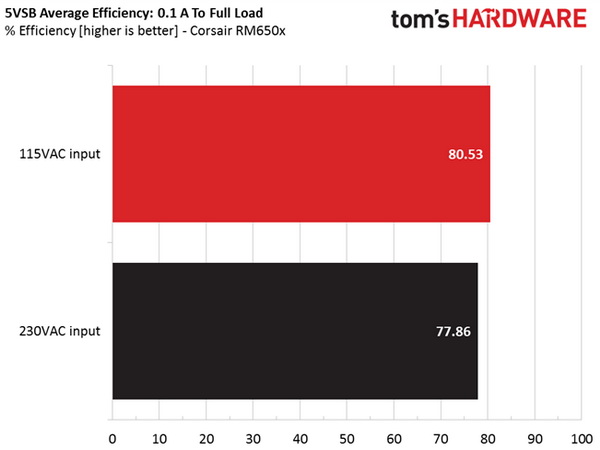
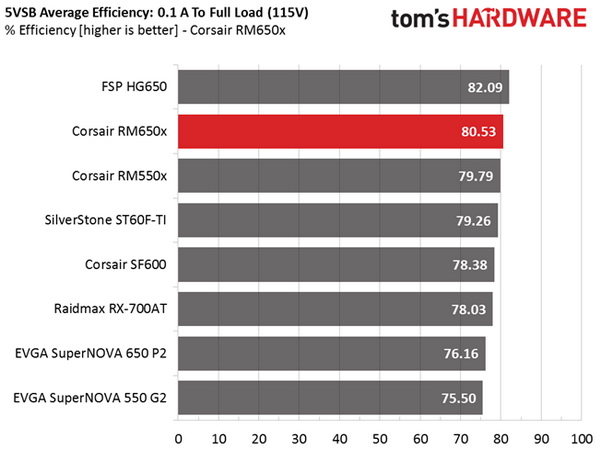
The 5VSB rail is highly efficient, losing only to FSP's HG650 and its advanced 5VSB circuit.
Power Consumption In Idle And Standby
In the table below, you'll find the power consumption and voltage values of all rails (except -12V) when the PSU is idle (powered on, but without any load on its rails), and the power consumption when the PSU is in standby mode (without any load, at 5VSB).
| Mode | 12V | 5V | 3.3V | 5VSB | Watts | PF/AC Volts |
|---|---|---|---|---|---|---|
| Idle | 12.075V | 5.048V | 3.316V | 5.048V | 7.58 | 0.465 |
| 115.2V | ||||||
| Standby | 0.05 | 0.005 | ||||
| 115.1V |
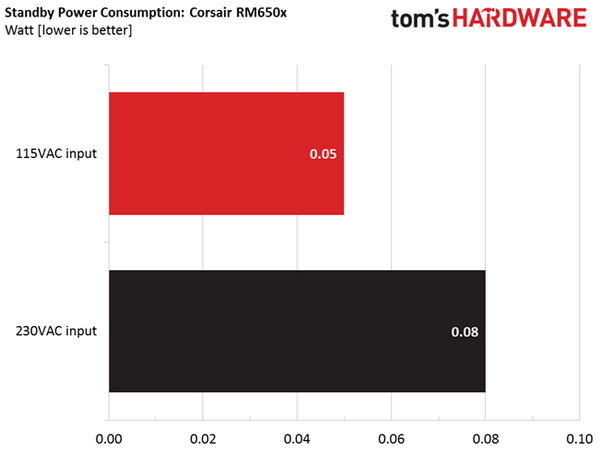
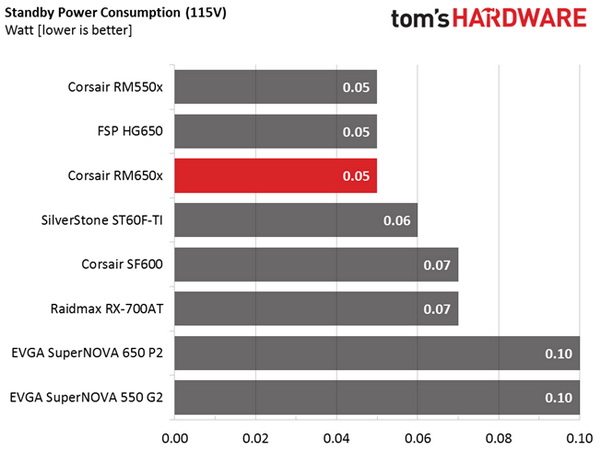
The RM650x easily meets the ErP Lot 6 2013 directive's requirements.
Fan RPM, Delta Temperature And Output Noise
Our mixed noise testing is described in detail here.
The first chart below illustrates the cooling fan's speed (in RPM), and the delta between input and output temperature. The results were obtained at 37 °C (98.6 °F) to 49 °C (120.2 °F) ambient temperature.
The next chart shows the cooling fan's speed (again, in RPM) and output noise. We measured acoustics from one meter away, inside a small, custom-made anechoic chamber with internals completely covered in sound-proofing material (be quiet! Noise Absorber kit). Background noise inside the chamber was below 18 dB(A) during testing, and the results were obtained with the PSU operating at 37 °C (98.6 °F) to 49 °C (120.2 °F) ambient temperature.
The following graph illustrates the fan's output noise over the PSU's operating range. The same conditions of the above graph apply to our measurements, though the ambient temperature was between at 28 °C (82.4 °F) to 30 °C (86 °F).
This is one of the quietest 650W PSUs we've tested. If you need a high-performance power supply that's almost always silent, the RM650X is a worthy candidate.
Current page: Efficiency, Temperature And Noise
Prev Page Load Regulation, Hold-Up Time And Inrush Current And Protections Next Page Evaluating Protection Features
Aris Mpitziopoulos is a contributing editor at Tom's Hardware, covering PSUs.
-
maxwellmelon for all the good listed in this article, this series of psu just gets bashed in the fourms, just interesting.Reply -
basroil Reply18305746 said:for all the good listed in this article, this series of psu just gets bashed in the fourms, just interesting.
You're thinking of the older RM650, different design.
The review here just made this unit be one of my recommended 650 models, tied with the EVGA G2/P2 and just below the Seasonic 660XP2! -
pjc6281 I have had this PSU for my new Skylake build for 2 months. Its GREAT, quiet and even have it pushing my old dinosaur Nvidia 590 with no problems. My old power supply was a Corsair AX1200 that was rock solid as well. Nothing but good experiences with them. I know others differ.Reply -
Dark Lord of Tech ReplyRMX doesn't get bashed , RMX and RMI are very very good. I own the RMX 850 , GREAT UNIT. -
TechyInAZ I'm glad the new RM series is much higher quality. All I remember Corsair having is a bunch of bad PSUs with select few good PSU (like AX and HX).Reply
I hope this same kind of quality intros into other models like the newly refreshed CX PSUs. -
Reply18305746 said:for all the good listed in this article, this series of psu just gets bashed in the fourms, just interesting.
Yeah, I believe you are confusing the RMx and RMi with the older, mostly discontinued RM line. And of the old RM line only the 750w and 850w versions that were first made by Chicony Power Technology had the bad reputation. Anyone bashing the RMx and RMi doesn't know what they are talking about. Once misinformation gets out there it's hard to get it corrected though.
Another great review Aris! :) -
Reply18308072 said:Why buy Corsair or EVGA when you can get a Seasonic?
Seasonic doesn't have a lock on quality. They also don't offer a 10 year warranty which both Corsair and EVGA do on some models. Just off the top of my head Flextronics, CWT and SuperFlower are all capable of making units that are at least equal to high end Seasonic quality. There are others as well. -
TechyInAZ Reply18308188 said:18308072 said:Why buy Corsair or EVGA when you can get a Seasonic?
Seasonic doesn't have a lock on quality. They also don't offer a 10 year warranty which both Corsair and EVGA do on some models. Just off the top of my head Flextronics, CWT and SuperFlower are all capable of making units that are at least equal to high end Seasonic quality. There are others as well.
Plus, efficiency levels are typically better with EVGA than Seasonic. -
Reply18308342 said:18308188 said:18308072 said:Why buy Corsair or EVGA when you can get a Seasonic?
Seasonic doesn't have a lock on quality. They also don't offer a 10 year warranty which both Corsair and EVGA do on some models. Just off the top of my head Flextronics, CWT and SuperFlower are all capable of making units that are at least equal to high end Seasonic quality. There are others as well.
Plus, efficiency levels are typically better with EVGA than Seasonic.
:??: Not sure what you mean. EVGA has a couple of 80 Plus Titanium models but Seasonic has Titanium models in their new lineup. I'm not sure if those new Seasonic models are available yet though. Other than that I've had an 80 Plus Platinum Seasonic ( 660XP2 ) for a couple of years and their Platinum line has been out since at least 2011.
